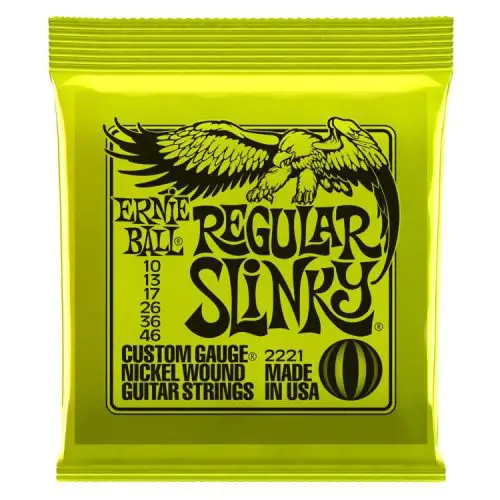The brand of guitar strings can indeed affect the tone of a guitar. Different string brands use different materials and manufacturing techniques, which can result in variations in tone. Factors such as the type of metal used, the thickness of the strings, and even the winding technique can all contribute to the overall sound produced by the guitar.
Many guitar players have experienced the difference in tone when switching from one brand of strings to another. Some brands may offer a brighter tone, while others may provide a warmer or more balanced sound. It ultimately comes down to personal preference and the kind of sound that the player is looking for.
When it comes to string brands, there are several well-known options in the market. Each brand has its own unique characteristics and can be suited to different playing styles and genres of music.
One popular brand is D’Addario, known for their consistency and durability. They offer a wide range of strings that cater to a variety of playing styles and musical genres. Some guitarists appreciate the bright and crisp tone of D’Addario strings, particularly in genres such as pop or country. On the other hand, some players may find them too bright for their taste and prefer a warmer tone.

D’Addario String
Another renowned brand is Ernie Ball, which is commonly associated with rock and alternative music. Ernie Ball strings are known for their versatility and balanced tone. They are favored by many professional musicians for their ability to handle aggressive playing and still maintain clarity and sustain.

Ernie Ball String
It’s important to note that the type of guitar you have can also influence the tonal differences. For example, acoustic guitars may respond differently to different string brands compared to electric guitars. It’s always a good idea to experiment and try different brands to find the one that suits your playing style and preference.
Ultimately, while the brand of strings can indeed affect the tone of a guitar, it’s just one factor among many that contribute to the overall sound. Other elements such as the guitar’s construction, pickups, and amplification also play a significant role. So, it’s worth exploring various brands and experimenting to find the strings that provide the desired tone and feel for your playing style.
Here’s a summary table for you busy musicians out there:
| Topic | Summary |
|---|---|
| Does string brand affect tone? | Yes, the brand of strings can affect the tone of a guitar. Different brands use various materials and manufacturing techniques, resulting in variations in sound. |
| What are the best string brands for different genres? | – Rock and Metal: Ernie Ball, D’Addario – Jazz: Thomastik-Infeld, D’Addario – Blues: Gibson, GHS, Fender – Country and Folk: Martin, Elixir – Classical: D’Addario, Savarez, Hannabach |
| Are more expensive string brands worth the investment? | The worth of more expensive string brands is subjective and depends on individual preferences, playing level, and durability. Cheaper brands can still offer satisfactory quality. |
| How often should guitar strings be changed? | Strings should be changed every 1-3 months, depending on factors such as playing frequency, playing style, and environmental conditions. Signs of wear and loss of brightness indicate the need for a change. |
| What are the different types of guitar strings available? | – Steel Strings: Bright and articulate, suitable for various genres – Nylon Strings: Warm and mellow, used in classical, flamenco, and fingerstyle genres – Coated Strings: Corrosion-resistant, longer lifespan – Specialty Strings: Flatwound, half-round, etc., for specific playing styles |
| Do different string brands sound different? | Yes, different string brands do sound different. Factors like materials used, manufacturing techniques, and winding process contribute to variations in tone. |
Best string brands for different genres
The best string brands for different genres can vary depending on the specific sound and playing style associated with each genre. Here are some popular string brands that are commonly recommended for specific genres:
- Rock and Metal: Ernie Ball and D’Addario are often preferred by rock and metal guitarists for their bright and aggressive tone. These brands offer a range of options for heavy gauges and high-output pickups, allowing for powerful and defined tones.
- Jazz: Flatwound strings, such as those offered by Thomastik-Infeld and D’Addario, are popular among jazz guitarists. These strings provide a warmer and more mellow tone, which complements the smooth and melodic nature of jazz music.
- Blues: Many blues guitarists prefer the warm and rich tones provided by vintage-style strings. Brands like Gibson, GHS, and Fender offer strings that are well-suited for blues, with a balance between brightness and warmth.
- Country and Folk: Martin and Elixir are highly regarded brands for acoustic guitar players in country and folk genres. These brands offer strings that enhance the natural resonance and warmth of acoustic instruments, providing a balanced and clear sound.
- Classical: With classical guitars, nylon strings are the standard choice. Popular brands for classical guitar strings include D’Addario, Savarez, and Hannabach. These brands offer a variety of tension options to suit different playing preferences.
It’s important to note that these recommendations are just general guidelines, and individual preferences may vary. Different guitarists within the same genre may have different preferences based on factors such as playing style, personal taste, and the specific sound they want to achieve.
When choosing string brands for different genres, it’s always a good idea to try out various options and find the one that suits your playing style, instrument, and personal preferences the best. Experimenting with different string brands can help you discover the tone and feel that resonates with your musical style and enhances your playing experience.
Also Read: Heavy Vs Light Guitar Strings: Sound, Playability & Tuning
Are more expensive string brands worth the investment?
While expensive string brands often offer higher quality materials and craftsmanship, it doesn’t necessarily mean they are the best choice for every guitarist. Whether more expensive string brands are worth the investment is subjective and depends on individual preferences and priorities.
Expensive string brands often use premium materials and undergo more rigorous quality control processes compared to cheaper alternatives. This can result in improved durability, better intonation, and overall enhanced performance. Additionally, some premium brands offer specialized string coatings or technologies that can prolong the lifespan of the strings and maintain their tone for a longer period.
For professional musicians or those who frequently perform or record, investing in more expensive strings may be beneficial. The superior quality and reliability can give them confidence in their sound and ensure consistent performance. Additionally, the extended lifespan of these strings can be cost-effective in the long run, as they may not need to be replaced as frequently.
However, for casual players or beginners on a budget, more expensive strings may not be necessary. Many mid-range and budget-friendly string brands still provide decent quality and can produce satisfactory tone and playability. It’s more important for these players to focus on regular string changing and proper maintenance techniques to keep their instrument in good shape.
Moreover, personal preference plays a significant role in determining if expensive strings are worth the investment. Some guitarists may find that they simply prefer the feel and tone of certain premium brands, while others may not notice a significant difference in sound quality between expensive and cheaper options.
Also Read: 7 Guitar String Alternatives: Can You Use Bass Or Fishing String
How often should guitar strings be changed?
How often guitar strings should be changed can vary depending on factors such as playing frequency, playing style, and personal preference. Generally, it is recommended to change guitar strings every 1-3 months for average players. However, there are a few indicators that can help determine if it’s time to change the strings.
The frequency of string changes can depend on several factors. Some guitarists prefer the bright and crisp sound of fresh strings and may change them more frequently, while others may find that strings lose their brightness and need to be changed less often.
Here are different factors that impact how often you should change guitar strings:
- Playing frequency. If you play your guitar every day for extended periods, your strings will naturally wear out faster due to constant use and exposure to oils and sweat from your hands. In this case, you may need to change your strings every 1-2 months or even more frequently.
- Playing style. Certain playing styles, such as heavy strumming or aggressive bending, put more stress on the strings and can cause them to lose their tone and intonation faster. If you play with a lot of force or use techniques that put extra strain on the strings, you may need to change them more frequently.
- Environmental factors can play a role in string longevity. Humidity, temperature changes, and exposure to dirt and debris can affect the condition of the strings. If you live in a particularly humid or dusty area, or if you frequently play in outdoor or demanding environments, you may need to change your strings more often.
Ultimately, the decision to change strings should be based on both objective factors and personal preference. If you notice that your strings are losing their brightness, feeling rough, or not holding their tune as well, it’s a good indication that it’s time to change them.
Some guitarists even have a specific routine for changing strings, such as before important gigs or recording sessions, to ensure optimal sound and playability.
It’s important to note that changing strings also depends on proper string maintenance. Regularly cleaning your strings, wiping them down after playing, and using a string lubricant can help prolong their lifespan and preserve their tone.
Overall, it’s recommended to develop a routine for string changing based on your playing frequency, style, and preferences. By paying attention to the condition of your strings and addressing any signs of wear or deterioration, you can ensure that your guitar always sounds its best.
What are the different types of guitar strings available?

Steel guitar string is the most popular string
The most common types of guitar strings include steel strings, nylon strings, and coated strings – each offering unique characteristics in terms of material, construction, and tone.
1. Steel Strings: Steel strings are the most popular choice for acoustic and electric guitars. They are made from a steel core wire wrapped with metal alloys such as nickel or bronze. Steel strings produce a bright and articulate tone, making them well-suited for various playing styles and genres, including rock, pop, country, and blues. They are also available in different gauges, which affects the string tension and overall feel.
2. Nylon Strings: Nylon strings, also known as classical or Spanish guitar strings, are made from a nylon core wrapped with either plain nylon or metal wire. These strings produce a warm and mellow tone, commonly associated with classical, flamenco, and fingerstyle genres. Nylon strings are typically used on classical guitars due to their softer tension and wider neck profile.
3. Coated Strings: Coated strings have a protective coating applied to the surface of the strings. This coating helps to prolong their lifespan by preventing corrosion and build-up of dirt and oils. Coated strings are available for both acoustic and electric guitars and offer a range of tones and playing feels similar to non-coated strings. Popular coated string brands include Elixir and D’Addario EXP.
4. Specialty Strings: In addition to the standard steel and nylon strings, there are specialty strings available for specific playing styles or instruments. Some examples include flatwound strings, which have a flat surface and produce a smoother and more mellow tone, and half-round strings, which have a rounded top and bottom and provide a compromise between the brightness of roundwound and the smoothness of flatwound strings.
It’s worth noting that within each type of string, there are further variations in terms of brand, gauge, and specific materials used. Different brands may offer unique characteristics, and experimenting with various options can help you find the strings that best suit your playing style and desired tone.
When choosing guitar strings, it’s important to consider factors such as your playing style, genre, and instrument type. Each type of string offers its own distinctive sound and feel, so finding the right strings can greatly enhance your playing experience and help you achieve the desired tone for your music.
Also Read: High Vs Low Action String: Which Is Easier To Play & Strum
Summary
In conclusion, the string brand does indeed affect the tone of a guitar. From the bright and crisp notes of D’Addario to the versatile punch of Ernie Ball, each brand offers its unique sonic flavor. While more expensive strings may offer superior craftsmanship and longevity, the decision to invest in them ultimately depends on your playing style and budget. Remember, it’s not just about the brand name, but finding the strings that resonate with your musical soul.
Changing guitar strings regularly is essential to maintain optimal tone and playability. Whether you rock out daily or strum occasionally, pay attention to the signs of wear and adjust your string-changing routine accordingly. Experimenting with different string brands and types opens up a world of sonic possibilities and helps you find the perfect fit for your genre and playing style.
So, fellow guitar enthusiasts, embrace the quest for the perfect tone, and let the strings be your melodic companions on your musical journey. May your chords ring true, your solos soar, and your guitar strings forever ignite the flame of musical expression!





